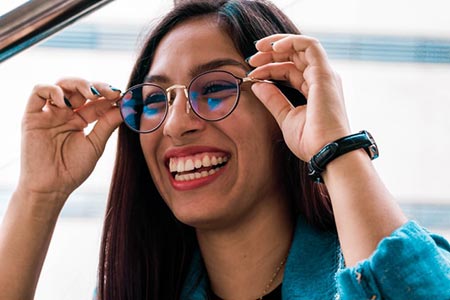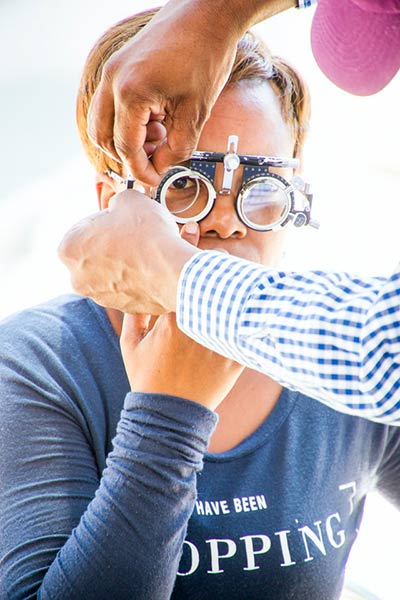How glasses should fit
 Eyeglasses serve the sole purpose of allowing you to see better under various conditions. To do so, you must undergo a test that determines the best prescription for you. While your prescription is important, if your glasses don’t fit properly, it won’t matter much. All glasses frames use a different design, which impacts how they fit on your face.
Eyeglasses serve the sole purpose of allowing you to see better under various conditions. To do so, you must undergo a test that determines the best prescription for you. While your prescription is important, if your glasses don’t fit properly, it won’t matter much. All glasses frames use a different design, which impacts how they fit on your face.
What well fitting glasses should provide
There are several factors to assess when determining how glasses should fit on your face. In general, glasses should provide a stable yet comfortable fit that allows you to move without them sliding off your face.
Whether you’re buying new glasses or need to re-adjust your current ones, continue reading to find out how glasses should fit.
How glasses should fit
Your face shape is essential when figuring out which glasses are best for you. Every pair of glasses uses varying frame lengths and templates. Each of these frame templates provides unique fits for every individual wearing them. After you’ve gone through the eye inspection stage, your doctor will ask you to choose which frames you like best.
During this stage, several measurements will be taken. These measurements provide an accurate view of which glasses will work best for your face type.
Here are all of the measurements used when figuring out the right sizes glasses for wearers:
⦁ Bridge Size- the entire length of the area that covers your nose
⦁ Eye Size- the whole length of one lens
⦁ Temple Size- measures the length of the arms of the eyeglasses from lens to the ear holders
⦁ Lens Height- total height of one lens
⦁ Frame Width- width of the frames from hinge to hinge
Once all of these measurements are taken, you can begin looking for the right glasses.
Getting the perfect fit in glasses
Using the measurements above, your eye doctor will give you personalized recommendations on the glasses that’ll be most comfortable. Remember, you want a pair of glasses that fit snug while giving you enough space to flex your face’s muscles.
If your glasses keep falling off, it’s a sign they are too loose. You can always get your glasses re-adjusted; simply speak with your eye doctor for more information.
People Also Ask
Q: How do I know if my glasses fit properly?
A: you’ll know if they fit correctly when they don’t slide off your face. Proper fitting glasses should touch your ear’s top right, the top left of the ear, and your nose.
Q: How should glasses fit on nose?
A: the nose pads on your glasses should fit comfortably on either side of your nostrils. The nose pad of your glasses shouldn’t leave any marks on your face when removed.
Q: How tight should they fit?
A: properly fitting glasses should apply a slight pressure behind your ears to keep them in place. If your glasses are too tight, they can slip up and down your nose, causing an uncomfortable fit.
Understanding how glasses should fit
Using all of the information in this article will help you find the perfect glasses in no time. Before making a decision about which glasses are right, test a few of them out. Doing so enables you to find the exact fit you want without any questions. For more information on glasses contact Tucson Optometry today.
 Eyesight is one of the critical sense that we, as humans, use regularly. Like with all things, time takes its toll on the quality of our eyesight, so staying on top of yours can be very beneficial. For many people, figuring out the best time to get an eye exam can be difficult. One of the exciting things about eyesight is that as you lose your vision, your brain adapts your other senses to make up for the first loss.
Eyesight is one of the critical sense that we, as humans, use regularly. Like with all things, time takes its toll on the quality of our eyesight, so staying on top of yours can be very beneficial. For many people, figuring out the best time to get an eye exam can be difficult. One of the exciting things about eyesight is that as you lose your vision, your brain adapts your other senses to make up for the first loss.